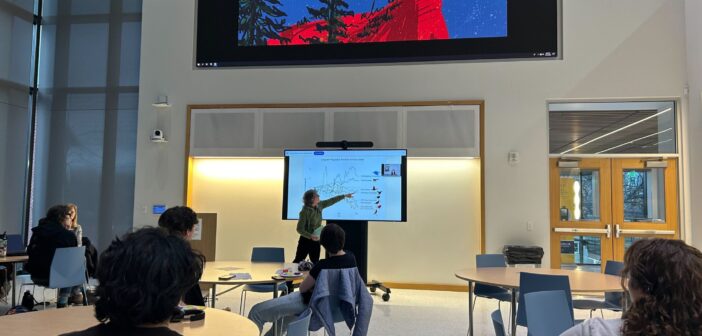Amid actions to shrink the federal work force by President Donald Trump’s administration, more than 1,000 National Park Service employees have been fired.
To discuss these recent cuts in funding and recent executive orders posing threats to parks, forests and wildlife habitats, Lehigh’s Birding Club, Outing Club, Conservation Club and BioBlitz came together to host a “Protect the Parks” panel.
Barbara Malt, a professor of psychology and co-advisor to the Birding Club, spoke at the event on Saturday. She said national parks are important layover stops for approximately 1,000 bird species in the country, especially migratory birds.
She also said there are many adverse effects of urbanization, and conserving protected land is extremely important for the environment.
“The United States loses about 2,000 acres of farm and ranch land every day, with 1 million being lost to urbanization, which, for the protection of native birds, is very harmful, as most species of birds cannot reproduce in urban environments,” Malt said. “They need forests, swamps and many more natural environments.”
Jennifer Jensen, a political science professor, also spoke. She said visits to national parks in the U.S. have rapidly increased.
According to the National Park Service, in 1980, national parks saw 220 million visitors. In 2024, there were more than 330 million visitors. That said, the National Parks Conservation Association reported the National Park Service has seen a 16% decrease in staffing since 2011, while there has been a 17% increase in park visitations.
Jensen said even with this steep increase in visitors, parks have received less funding in recent years beyond the newly proposed cuts.
In July 2024, the federal government cut $210 million from the park budget. This followed after the Department of the Interior requested a budget of $3.6 billion in May 2024 for the 2025 fiscal year.
Jensen said the budget cuts will lead to lower availability, as less funding can lead to partial closures due to a limited number of employees and a lack of maintenance. She also said budget cuts make it difficult to catch poachers and those looking to exploit national park resources due to less rangers being able to patrol the grounds.
It could also lead to more significant destruction from wildfires, Jensen said.
“The instituted hiring freeze could be a big deal come wildfire season, as the parks do not have the ability to hire people to help combat it, leading to the possibility of a much more destructive fire season,” she said.
Larissa Walker, ‘11G, the director of outreach and engagement at the National Parks Conservation Association in Washington D.C., also spoke at the panel.
Walker said the parks were already understaffed and underfunded before the Trump administration employed the recent executive orders, but the threats to the National Park Service have never been as concerning as they are currently.
“One of the biggest threats is the agency losing its staff, which are integral for managing the national and cultural interests of our national park system,” she said.
Walker also said the layoffs of park workers is not the only issue. The Trump administration’s attempts to restore mineral and drilling rights in federally protected lands, as well as plans to shutter some visitor centers in parks, are large threats to the system.
She said there have already been a number of protests across the country in support of the National Parks Service. To advocate against the budget cuts, Walker suggested people contact local representatives and encourage family, friends and neighbors to do the same.
She also reminded attendees that if anyone visits a national park soon, patience is important, because low staffing may lead to long lines and some closures.
“The workers at the national parks have been going through a very chaotic time, so if you find yourself visiting a national park, make sure to show them your patience and appreciation,” she said.
Clem Palevich, ‘25, attended the event because he said he believes the country’s natural beauty is always important to preserve.
He also said it’s important for the community to engage in civic participation in order to make a difference.
“Stay active about things that are important to you,” Palevich said. “We have the power to make a difference and contact our local representatives about issues we care about. Your voice is heard.”






Comment policy
Comments posted to The Brown and White website are reviewed by a moderator before being approved. Incendiary speech or harassing language, including comments targeted at individuals, may be deemed unacceptable and not published. Spam and other soliciting will also be declined.
The Brown and White also reserves the right to not publish entirely anonymous comments.